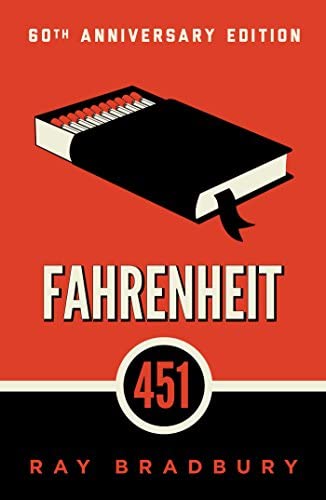
Fahrenheit 451 is a potent dystopian novel written by Ray Bradbury in 1953. It combines a great story with meaningful commentary on the state of the world. The book is set to take place sometime in our near future (2049), where firemen burn books and start fires rather than put them out. Books have been banned due to the fact that they cause readers to think deeply and possibly become dissatisfied with life. The protagonist, Guy Montag, is one of these firemen.
When the story begins, Montag seems completely satisfied with his life. He loves that every day is the same: he goes to work, comes home to his wife, and watches the television without questioning even the impending war and its outlook. This all changes when he meets an eccentric neighborhood girl named Clarisse McClellan, who is able to spark within Montag the ability to think deeply. At first, Montag dismisses Clarisse as strange and crazy, especially when she asks,”Do you ever read any of the books you burn?”
But something about that question seems to get under his skin. He begins to have doubts about his work, wondering if firemen had always started fires and the real reason why books are banned. Once Clarisse disappears, Montag starts to pick up the same books he once burned. His colleagues and wife warn him, but Montag spouts poetry in front of his wife’s friends and is reported. His own team of firemen arrive to do to Montag’s house what he has done to so many other homes. Understanding that Clarisse has been killed by the government and that the same may happen to him, Montag still feels that he has no choice. As the world he knows crumbles around him, Montag abandons his society and its laws to fight for free thought and uncensored literature. Nevertheless the book ends on a hopeful note, with Montag trying to save the citizens of the city, not only from the war, but also from the chains that they had created for themselves when they had unquestioningly supported the banning of literature.
There is something chilling about reading a novel 70 years after it was published, especially when the dystopian society being described in it eerily resembles the one you live in. Ray Bradbury comments on how the world is hurtling towards an intellectually void society where technology inhibits thinking ability and limits attention spans. He describes a world in which meaningful and thought-provoking conversations have become a thing of the past, replaced by stimulations that merely provide empty and instant gratification. This could be compared to the rapid simplification of modes of entertainment that we see in our world today, such as three seconds of poorly animated spinning rats.
The way in which Montag’s wife, Mildred, is constantly more attentive to the television than her husband makes us question if we are becoming too attached to technology. This is akin to seeing couples at a dinner table texting someone else on their phones rather than getting to know each other. Bradbury further explains that the television program takes the form of an announcer who appears as if he is addressing you individually: “The converter attachment, which had cost them one hundred dollars, automatically supplied her name whenever the announcer addressed his anonymous audience…He was a friend, no doubt of it, a good friend.” By comparing digital entertainment to friendship, Bradbury expresses concern that technology may one day come to entirely replace real human connections. This becomes even more relevant in our time, where features such as Netflix’s “Top Picks for You” or Youtube’s “Recommended Section” act as your friends, knowing exactly what you like to do. Each of your interactions with these websites is tracked, which allows these features to function. In fact, in some ways, Bradbury might suggest that your technology might know you better than you know yourself.
70 years ago, even without experiencing the internet, Ray Bradbury predicted the dangers of mass media emphasizing bliss and comfort over thought and conversation. In their pursuit of happiness, the citizens of the society in Fahrenheit 451 choose to pursue the bliss found in ignorance rather than face the discomfort of thinking for themselves. In Montag’s case, this discomfort stemmed from standing up against the pressures of his society.
Bradbury tries to tell us that thinking for oneself and acting independently does require a degree of discomfort. Fahrenheit 451 itself serves as an extension of this principle; it might make you uncomfortable in order to change your views and make you think. Bradbury saw the increasing degree of comfort and convenience in modern life. Televisions, phones, publicly accessible vehicles, and commercial airplanes were all made to make life easier for us. While most people in Bradbury’s time viewed the changes as a great advancement in society, Bradbury knew the potential dangers of humans pursuing comfort to such a degree. In fact, Bradbury’s dystopian society uses comfort as a tool to restrict free-will and enforce conformity. In writing about a future society in which free will has been restricted, Bradbury criticizes and condemns the suppression of individual thought and creativity that he had seen within his own time. Many of the disturbing points from Fahrenheit 451 can be directly applied to our own age, where we live comfortably with many of the technologies that Bradbury predicted.
Bradbury’s prescient and well-written novel doesn’t just make for an entertaining read; it will make you rethink your view on your own life and the time we live in. Whether you are looking to find a new perspective on the world around you, trying to find a book to read to pass time, or have been forced by your school to read the book as I have, reading this novel will be an eye-opening experience. No matter your level of reading or subject interests, Fahrenheit 451 will be worth your time.
Check out Fahrenheit 451 From NBPL!
